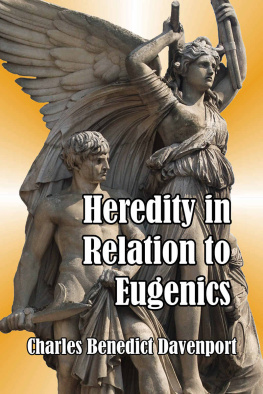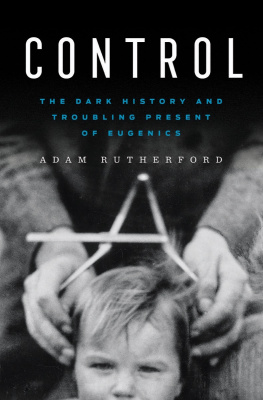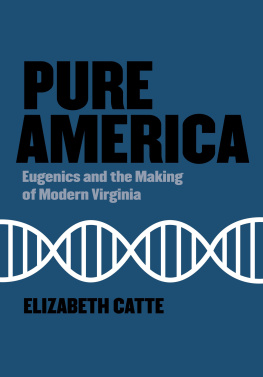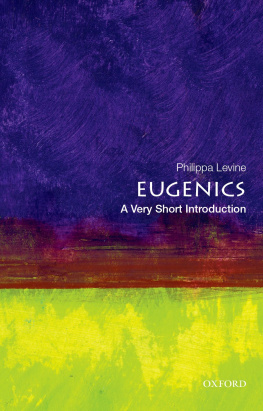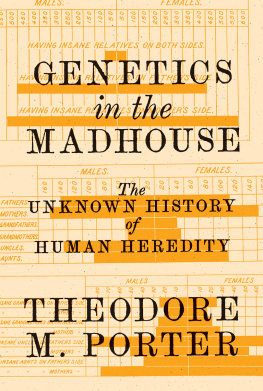Preface
Recentgreat advances in our knowledge of heredity have revolutionized the methods ofagriculturalists in improving domesticated plants and animals. It was earlyrecognized that this new knowledge would have a far reaching influence upon certainproblems of human societythe problems of the unsocial classes, of immigration,of population, of effectiveness, of health and vigor. Now, great as are thepotentialities of the new science of heredity in its application to man it mustbe confessed that they are not yet realized. A vast amount of investigationinto the laws of the inheritance of human traits will be required before itwill be possible to give definite instruction as to fit marriage matings. Oursocial problems still remain problems. For a long time yet our watchword mustbe investigation. The advance that has been made so far is chiefly ingetting a better method of study.
Inthis book I have sought to explain this new method. An application of thismethod to some specific problems, specially to the transmission of varioushuman traits and susceptibilities to disease, has been attempted. The suggestionsmade are by no means final but are made to illustrate the general method andgive the most probable conclusions. Only with much more accurate data can the lawsof inheritance of family peculiarities be definitely determined.
Somegeneral consequences of the new point of view for the American population havebeen set forth in Chapters IV to VI. Their essential truth will, I trust, begenerally recognized. In any case it will not be amiss to point out thefundamental difference between the modern eugenical and the contrasted or"euthenical" standpoints. As a matter of fact the eugenic teachingsthat we think of as new are very old. Modern medicine is responsible for theloss of appreciation of the power of heredity. It has had its attention tooexclusively focused on germs and conditions of life. It has neglected thepersonal element that helps determine the course of every disease. It hasbegotten a wholly impersonal hygiene whose teachings are false in so far asthey are laid down as universally applicable. It has forgotten the fundamentalfact that all men are created bound by their protoplasmic makeup and unequalin their powers and responsibilities.
Asindicated, it is the aim of this book to incite to further investigation. Somespace is devoted to the eugenics movementa movement which it is hoped will, inthis country, for the present, take mainly the form of investigation. To thismovement the Eugenics Record Office (a branch of the work of the AmericanBreeders' Association) is dedicated. The Eugenics Record Office wishes to getin touch with all persons interested in the eugenics movement. It invites everyperson who is willing to do so to record his heritage and place the record onfile at the Record Office. "Drop a postal card" at once to theEugenics Record Office, Cold Spring Harbor, New York, and ask for the blankschedule they furnish. It is understood that all data deposited in this waywill be held as confidential and be used only for scientific purposes. The datareceived are carefully preserved in a fireproof vault and indexed so as to beavailable to the student. Specifically, the Record Office seeks pedigrees offamilies in which one or more of the following traits appear:short stature,tallness, corpulency, special talents in music, art, literature, mechanics,invention and mathematics, rheumatism, multiple sclerosis, hereditary ataxy, Mnire'sdisease, chorea of all forms, eye defects of all forms, otosclerosis,peculiarities of hair, skin and nails (especially red hair), albinism, harelipand cleft palate, peculiarities of the teeth, cancer, Thomsen's disease,hemophilia, exophthalmic goiter, diabetes, alkaptonuria, gout, peculiarities ofthe hands and feet and of other parts of the skeleton. We do not appealprimarily to physicians for this information but to the thousands ofintelligent Americans who love the truth and want to see its interestsadvanced. At the same time, physicians can aid in the work by inducing personswith bodily or mental peculiarities that run through their families to send tothe Record Office for blank schedules on which to record the method ofinheritance of the trait in question. Thus everyone can share in the eugenicsmovement.
TheEugenics Record Office will be glad to assist in the establishment of localeugenics societies which shall become centers for the study of local bloodlinesand for local instruction. The Office seeks to assist state officials in thestudy of the classes which are supported and protected by the State, and toassist the States to locate the centers in which their defectives anddelinquents are being bred. It is believed that a little money spent instudying the sources of reproduction of persons who are destined to becomestate wards will prove a highly profitable investment, since it may lead tosteps that will diminish such reproduction.
Inthe preparation of the present volume the author has been aided by many hands.Professor James A. Field, of the University of Chicago, has kindly read theproof and made valuable suggestions. The bibliography and the pedigree chartswere largely prepared by Miss Amey B. Eaton, of the Eugenics Record Office.Professor E. B. Wilson has generously granted me the use of Figures 1 to 6 fromhis invaluable book, The Cell in Development and Inheritance. Hundredsof persons have voluntarily contributed the data upon which the conclusionsthat have been drawn are based. My friend and colleague, Mr. H. H. Laughlin,Superintendent of the Eugenics Record Office, has assisted in many points andhas contributed the frontispiece. My wife has, as usual, revised the manuscriptand prepared it for the printer. The Trustees of the Carnegie Institution havegranted me exceptional opportunities for the prosecution of the work. Last, butby no means least, this work and the collection of data out of which it hasgrown have been made possible by the financial assistance and by the personalstimulus and advice given by the lady to whom, in insufficient recognition,this book is, with her permission, dedicated. To all those who have so kindlyassisted me I return thanks. I trust the book will be useful to humanity, so asto justify them for the pains they have taken to bring it to pass.
C. B.D.
CarnegieInstitution of Washington
Stationfor Experimental Evolution
ColdSpring Harbor, N. Y.
ChapterI: Eugenics: Its Nature, Importance and Aims
1. WhatEugenics Is
Eugenicsis the science of the improvement of the human race by better breeding or, asthe late Sir Francis Galton expressed it: The science which deals with allinfluences that improve the inborn qualities of a race." The eugenicalstandpoint is that of the agriculturalist who, while recognizing the value ofculture, believes that permanent advance is to be made only by securing thebest "blood." Man is an organisman animal; and the laws of improvementof corn and of racehorses hold true for him also. Unless people accept thissimple truth and let it influence marriage selection, human progress willcease.
Eugenicshas reference to offspring. The success of a marriage from the standpoint ofeugenics is measured by the number of disease-resistant, cultivable offspringthat come from it. Happiness or unhappiness of the parents, the principal themeof many novels and the proceedings of divorce courts, has little eugenicsignificance; for eugenics has to do with traits that are in the blood, theprotoplasm. The superstition of prenatal influence and the real effects ofvenereal disease, dire as they are, lie outside the pale of eugenics in itsstrictest sense. But no lover of his race can view with complaisance theravages of these diseases nor fail to raise his voice in warning against them.The parasite that induces syphilis is not only hard to kill but it frequentlyworks extensive damage to heart, arteries and brain, and may be conveyed fromthe infected parent to the unborn child. Gonorrhea, like syphilis, is aparasitic disease that is commonly contracted during illicit sexualintercourse. Conveyed by an infected man to his wife it frequently causes herto become sterile. Venereal diseases are disgenic agents of the first magnitudeand of growing importance. The danger of acquiring them should be known to allyoung men. Society might well demand that before a marriage license is issuedthe man should present a certificate, from a reputable physician, of freedomfrom them. Fortunately, nature protects most of her best blood from thesediseases; for the acts that lead to them are repugnant to strictly normalpersons; and the sober-minded young women who have had a fair opportunity tomake a selection of a consort are not attracted by the kind of men who are mostprone to sex-immorality.

